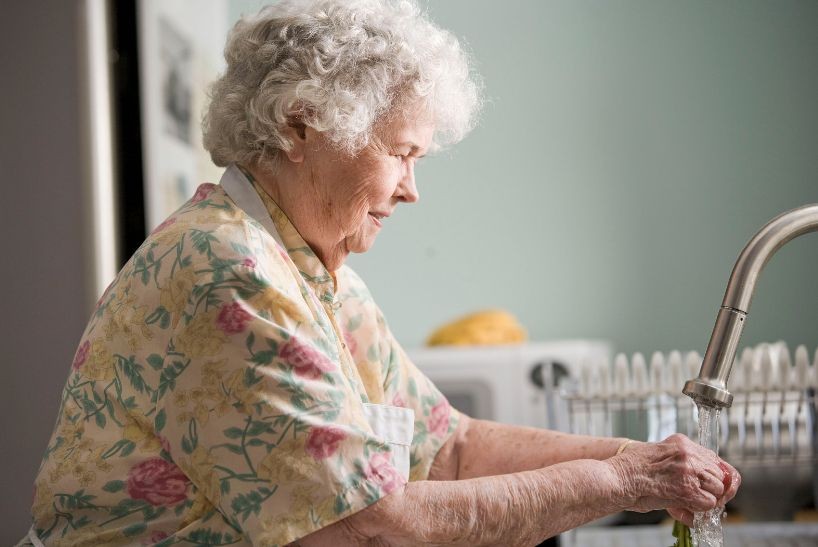How to determine the right care requirements
Specialist topics
How to determine the right care requirements
The Swiss population is getting older. Thanks to the increasing quality of life and comprehensive medical options, people are living longer and longer. This is of course a very pleasing fact, but at the same time a major challenge. More and more people are dependent on support in old age. In order to provide this in the best possible way, Spitex determines the level of care required.

The Swiss population pyramid is changing
Demographic change affects all Swiss people. It is not just a question of ensuring that older people receive the best possible care. Their families are also involved, as they are usually the ones who go looking for support. In some cases, they even take over the care themselves.
Of course, the healthcare system itself is also involved. The stakeholders must ensure that sufficient qualified nursing staff are available.
Younger generations are also affected by demographic change. They see how their grandparents are faring and can make a valuable contribution, for example, thanks to the fact that they have yet to choose a career. It is no secret that the healthcare sector is facing a shortage of skilled workers. Spitex organizations are not spared.
This makes it all the more important to precisely define and optimize the services to be provided. Only in this way can the available resources be used as effectively as possible. An important point here is the precise clarification of care needs.
How does Spitex define the need for care?
The need for care defines the deficiency clients feel that can be remedied by providing a certain level of care. This goes hand in hand with satisfying their needs. However, for this to succeed, a number of questions must first be clarified, including:
- What exactly is the deficiency due to?
- What is the current situation and what is the ideal outcome?
- Who can meet the need?
Spitex answers these and other questions together with its clients in the form of a needs assessment.
Why does Spitex clarify the need for care?

By clarifying the need for care, Spitex creates an important basis for the subsequent provision of care. The aim is to provide comprehensive care that will improve the quality of life as much as possible.
As a general rule, the smaller the difference between the actual state and the ideal state, the higher the quality of life. However, this is by no means a static situation. Of course, the actual state is subject to fluctuations. At best, clients move in a positive direction.
Once clients have achieved a goal - such as eating independently - they will set themselves a new one. For example, they may now want to learn to dress themselves again. The gap between the current situation and the goal is therefore widening again after having been at a minimum for a while.
And that's a good thing. After all, care should help clients to become more independent again and not force them into dependent relationships. With optimal support, one milestone can follow the next.
However, this is only possible thanks to a comprehensive and individual needs assessment. This needs to be adapted again and again if circumstances change.
Clarifying the need for care as a legal requirement

Drawing up a needs assessment is not just an important means to an end. It is actually a legal requirement. Health insurance will only cover certain care costs if such an assessment has been carried out.
Spitex organizations use specific survey forms to prepare a needs assessment. They define the possible services and the time that can be taken into account in each case.
These include, for example, assessing the patient's general condition, taking samples for the laboratory or administering medication. The administration of infusions, wound treatment and other medical measures are also defined in the plan.
However, nursing tasks are also part of the needs assessment. These include, among other things:
- Full or partial washing in bed or in the bathroom
- Washing hair
- Cutting nails
- Dental care
- Dressing and undressing
- Assistance with eating and drinking
- Help with walking
The Spitex staff describe the current medical situation in detail on the questionnaire. They then determine how many visits there will be per week and how long they will last.
Software for clarifying care needs

Spitex organizations now have software at their disposal. It speeds up the process of clarifying care needs and forwarding the information provided. One of these systems is interRAI HomeCare Switzerland. This is a questionnaire and evaluation system.
It supports Spitex employees in defining and assessing the needs of clients. At the same time, it facilitates cooperation with the attending physicians, hospital staff and therapists. This form of information collection also makes it easier to answer queries from health insurance companies.
And interRAI HomeCare Switzerland offers yet another advantage: it provides valuable information on where the average demand is highest. The system thus provides the basis for important approaches to improving services.
Another system available to Swiss Spitex organizations is interRAI Community Mental Health. It is aimed at organizations that care for mentally ill clients.
It not only helps employees to better assess needs. The system also helps them to better identify the strengths of clients, on which care can be built.
How do Spitex organizations handle the personal data from the needs assessment?

The employees will also ask the client personal questions in order to draw up an individual needs assessment. The answers are usually stored electronically - as are the specified services.
Spitex treats all this data as strictly confidential and does not pass it on to third parties without the client's consent. Only the people directly involved in the medical and nursing care have access to it.
The Spitex employees only ask the client questions that are urgently needed to clarify individual needs. If the client feels uncomfortable about a topic, they do not have to say anything about it. However, the more comprehensive the answers to the questions, the better the support can be tailored to the client.
Every client naturally has the opportunity to view their own data and request information at any time. The same applies to you if you take on the role of legal representative.
The right Spitex organization for your relative
If your relative needs help coping with everyday life, it is often you or other family members who step in. However, this is not always feasible in the long term. This is especially true if your relative needs medical care that you are unable to provide.
In such cases, Spitex provides the necessary support. It ensures that your relative wants for nothing and relieves you considerably. We at OPAN® will help you find the right Spitex organization. Please feel free to contact us and give us a call or send us an e-mail.
